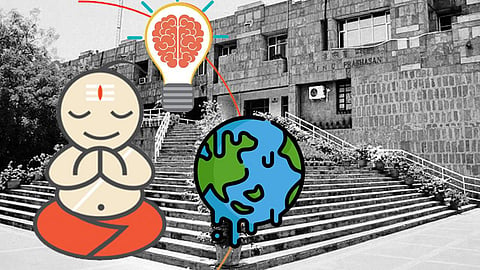

India is going through a rough patch as we struggle to find our roots and hang tight to them. And what better way but through one of the oldest languages in the sub-continent — Sanskrit. While Tamil lived on, evolving with time, Sanskrit was declared almost-dead by a section of society years ago.
But the School of Sanskrit and Indic Studies (SSIS) at Jawaharlal Nehru University (JNU) is working hard to tell people how relevant our traditional texts are when it comes to solving new age problems — from global warming to mental health. As parts of UP burns and the streets of Delhi are raging with CAA and NRC protests they have organised a two-day national seminar from December 27 to 28 on Sanskrit as the source of the Indian Knowledge System or as they call it in Sanskrit Bhartiyajanaparamparayah strotah Sanskritam. The more amazing aspect is that the entire seminar, where scholars from different disciplines will be present, will be conducted in Sanskrit. The seminar has been organised in collaboration with Uttar Pradesh Sanskrit Sansthan, Lucknow and Prajna Pravah Pratisthan, New Delhi.
Dr Ram Nath Jha who teaches at the Department, who has been pivotal in organising the conference said that around 100 research papers will be presented in Sanskrit. "They will all be related to traditional Indian knowledge and modern sciences. We want to highlight how Sanskrit has answers to all the new age problems that we are facing now. This only proves how alive a language it is and that it is definitely not dead. Many of our young scholars speak fluent Sanskrit and are also collaborating with other departments for interdisciplinary research," he said.
"The conference will be covering traditional and contemporary aspects of four Vedas, four Upavedas, Six Vedangas, Dharmashastra, Nyaya, Mimamsa, Purana, Indian Philosophy, Agama, Sixty-four Kalas, poetry and poetics, Pandulipi, Arthashastra, Vastushastra and more," he added.
Dr Jha said that legendary scientists like Neils Bohr have read our ancient texts. "The WHO's declarations and movites was inspired by our Sanskrit slokas and texts. Only now the civil society is talking about back to nature but we have always spoken about how forests are an essential part of our lifestyle," said Dr Jha.
Dr Jha is hell-bent to tell us why and how Sanskrit is still relevant. "There are discussions about every topic in our ancient texts and they are still relevant. Students from bio tech departments are also coming. More than 100 delegates including Vice-Chancellor, Directors, traditional Sanskrit scholars, Professors and young Sanskrit scholars will visit JNU for this seminar. The special attraction of this conference is the confluence of young and senior Sanskrit scholar from Gurukul and Universities at the same platform for deliberation or above issues. A Sanskrit drama on ‘Chankaya Pratijna’ will also be presented in this conference.
